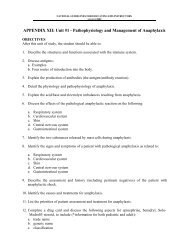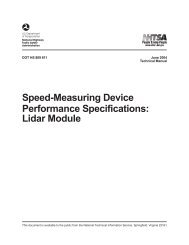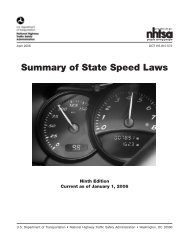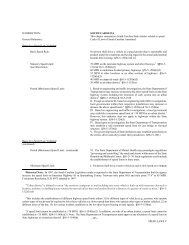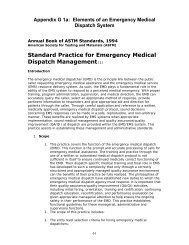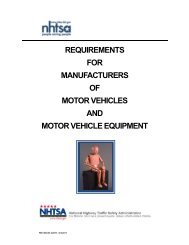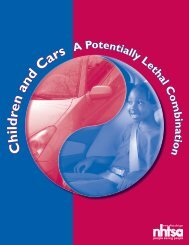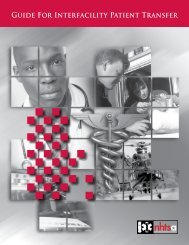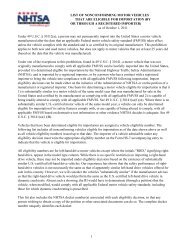The Criminal Justice System: A Guide for Law Enforcement ... - NHTSA
The Criminal Justice System: A Guide for Law Enforcement ... - NHTSA
The Criminal Justice System: A Guide for Law Enforcement ... - NHTSA
You also want an ePaper? Increase the reach of your titles
YUMPU automatically turns print PDFs into web optimized ePapers that Google loves.
Motions that are contested result in hearings. A hearing may simply be an<br />
argument by attorneys of legal issues, or it may be an evidentiary hearing at which<br />
witnesses testify. <strong>The</strong> most common pre-trial evidentiary hearing is a suppression<br />
hearing where the prosecution calls one or more police officers to testify about the<br />
manner in which evidence was obtained. If the prosecution fails to establish that the<br />
evidence was obtained in a manner consistent with the defendant’s constitutional rights,<br />
the evidence will be suppressed.<br />
Probable Cause (Reasonable Cause) A level of proof that is reached if a<br />
reasonable person would conclude that something is probably true. Probable cause is a<br />
higher level of proof than “reasonable suspicion,” but a lesser level of proof than “proof<br />
beyond a reasonable doubt.” (See each defined, below.)<br />
<strong>The</strong> probable cause standard is referenced in the Fourth Amendment, and is a<br />
required hurdle at several stages of a prosecution. For example, a police officer may<br />
arrest a suspect only if the officer has probable cause to believe the suspect has<br />
committed a crime. Similarly, a grand jury may indict a defendant only if it finds<br />
probable cause to believe the defendant committed one or more crimes.<br />
Some State statutes, such as in New York, commonly use the term “reasonable<br />
cause.” That term is synonymous with probable cause and should not be confused with<br />
reasonable suspicion, which is a lesser level of suspicion.<br />
Probation A sentence that entails supervision by a probation officer. Probation is<br />
possible in cases where the defendant is convicted of a crime that does not mandate<br />
incarceration in State prison. Accordingly, probation is a common sentence <strong>for</strong> defendants<br />
convicted of misdemeanors and lower level felonies with little or no criminal history.<br />
It is possible to receive a sentence consisting of both local jail time plus<br />
probation. This is often referred to as a “split sentence.” For example, a New York<br />
defendant convicted of a certain felonies may be sentenced to six months in jail plus a<br />
concurrent term of five years in probation. That means the defendant would first do his<br />
jail time and then, when released from jail, would be under the supervision of the<br />
probation department until the probation expired.<br />
Probation is often confused with parole, which is supervision by a parole<br />
officer following an inmate’s release from a State prison.<br />
Proof Beyond a Reasonable Doubt A level of proof that is reached if a reasonable<br />
person would be firmly convinced that something is true. This is a higher level of proof<br />
than probable cause. A jury may not convict a defendant unless the jurors are convinced of<br />
guilt by proof beyond a reasonable doubt. <strong>The</strong> law does not require the prosecution to<br />
prove a defendant guilty beyond all possible doubt. On the other hand, a reasonable doubt<br />
is an honest doubt of the defendant's guilt <strong>for</strong> which a reason exists based upon the nature<br />
and quality of the evidence. It is an actual doubt, not an imaginary doubt.<br />
Reasonable Suspicion A level of proof that is reached if a reasonable person<br />
would conclude that illegal activity is afoot. This is a lower level of proof than probable<br />
35



